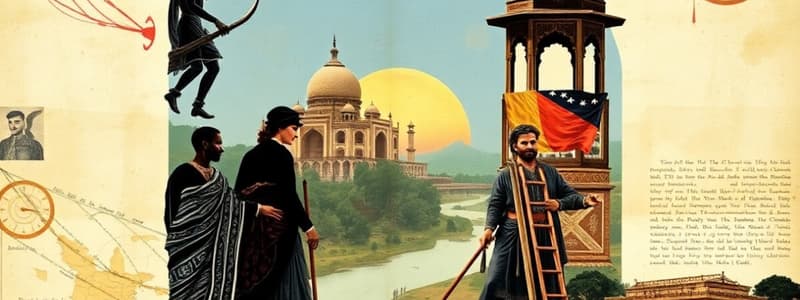Podcast
Questions and Answers
What is the primary cause of suffering according to the Four Noble Truths?
What is the primary cause of suffering according to the Four Noble Truths?
- Attachment
- Rebirth
- Desire (correct)
- Ignorance
Which of the following is NOT one of the Eightfold Path aspects?
Which of the following is NOT one of the Eightfold Path aspects?
- Right speech
- Right mindfulness
- Right effort
- Right income (correct)
What does achieving Nirvana signify in Buddhism?
What does achieving Nirvana signify in Buddhism?
- Denial of self
- Permanent enlightenment
- Rebirth
- Freedom from suffering (correct)
Which historical figure expanded the Maurya Empire and adopted Buddhism?
Which historical figure expanded the Maurya Empire and adopted Buddhism?
Why might a shudra or untouchable be drawn to Buddhism?
Why might a shudra or untouchable be drawn to Buddhism?
Which festival is celebrated to honor Buddha?
Which festival is celebrated to honor Buddha?
What do the 8 Garudhammas primarily emphasize?
What do the 8 Garudhammas primarily emphasize?
What does being bald symbolize in Buddhism?
What does being bald symbolize in Buddhism?
What were the two major cities of the Indus River Valley civilization?
What were the two major cities of the Indus River Valley civilization?
What was one consequence of the increased food supply in the Indus River Valley?
What was one consequence of the increased food supply in the Indus River Valley?
Which group is considered the highest in the traditional caste system?
Which group is considered the highest in the traditional caste system?
What is the term for the belief that one's actions will influence their future reincarnation in Hinduism?
What is the term for the belief that one's actions will influence their future reincarnation in Hinduism?
What is meant by 'moksha' in Hinduism?
What is meant by 'moksha' in Hinduism?
Which social division in ancient India was known for handling dead animals and people?
Which social division in ancient India was known for handling dead animals and people?
What did Siddartha Gautama seek to understand that led to the founding of Buddhism?
What did Siddartha Gautama seek to understand that led to the founding of Buddhism?
Which practice is essential to achieving enlightenment in Buddhism?
Which practice is essential to achieving enlightenment in Buddhism?
Flashcards
Indus River Valley Civilization (RVC)
Indus River Valley Civilization (RVC)
An ancient civilization that flourished along the Indus River in present-day Pakistan and northwestern India, known for its advanced cities like Harappa and Mohenjo-Daro.
Varna
Varna
The four social classes in ancient India: Brahmins (priests), Kshatriyas (warriors/aristocrats), Vaishyas (merchants), and Shudras (peasants).
Caste System
Caste System
A rigid social hierarchy in ancient India, based originally on color, later on occupation, and profoundly influencing social life and economic opportunities.
Brahmins
Brahmins
Signup and view all the flashcards
Hinduism
Hinduism
Signup and view all the flashcards
Karma
Karma
Signup and view all the flashcards
Moksha
Moksha
Signup and view all the flashcards
Buddhism
Buddhism
Signup and view all the flashcards
The Four Noble Truths
The Four Noble Truths
Signup and view all the flashcards
Eightfold Path
Eightfold Path
Signup and view all the flashcards
Right Intentions
Right Intentions
Signup and view all the flashcards
Reincarnation
Reincarnation
Signup and view all the flashcards
Enlightenment
Enlightenment
Signup and view all the flashcards
Ashoka the Great
Ashoka the Great
Signup and view all the flashcards
Nirvana
Nirvana
Signup and view all the flashcards
Buddhism's appeal to low-caste
Buddhism's appeal to low-caste
Signup and view all the flashcards
Study Notes
Indus River Valley Civilization (IVC)
- Two major cities: Harappa and Mohenjo-Daro
- Increased food supply led to population growth and specialization of labor (artisans)
- Trade networks developed
- Urban planning with granaries, sewage systems, and city walls
- Taxes and social classes emerged
- Environmental changes (earthquakes, drought) caused migration
Religion
- Aryans, light-skinned people, migrated from Indo-Europe
- Social divisions (Varna) evolved into the caste system.
- Caste system initially based on skin color, later on occupation.
- Four main varnas: Brahmins (priests), Kshatriyas (warriors/aristocrats), Vaishyas (merchants), Shudras (peasants)
- Untouchables were outside the caste system and handled tasks considered impure.
- Fate is determined by birth into a caste.
- Concept of reincarnation and karma.
- Upanishads focused on one universal soul (Brahman).
- Believed in vegetarianism and reincarnation.
- Karma dictated one's next life or re-incarnation.
- Moksha, or liberation from the cycle of birth and death, was achievable through dharma (righteous living)
Hinduism
- Concept of one universal soul, Brahman.
- Belief in reincarnation and karma.
- Souls may inhabit human or animal forms.
Buddhism
- Founded by Siddhartha Gautama (the Buddha)
- Saw human suffering and sought enlightenment.
- Achieved nirvana through the eightfold path.
- Eightfold Path: right view, intention, speech, action, livelihood, effort, mindfulness, and concentration.
- Four Noble Truths: suffering is inevitable, suffering's cause is desire, there is an end to suffering, the eightfold path leads to the end of suffering.
- Believed in reincarnation and the possibility of achieving nirvana in one lifetime.
- Gender equality was a principle in Buddhism.
- Holidays like Buddha day involved fasting and honoring the Buddha.
Maurya Empire
- Chandragupta Maurya united India
- Grandson, Ashoka expanded the empire through trade and warfare
- Later converted to Buddhism
- Achieved peace through diplomacy, not warfare.
Studying That Suits You
Use AI to generate personalized quizzes and flashcards to suit your learning preferences.




